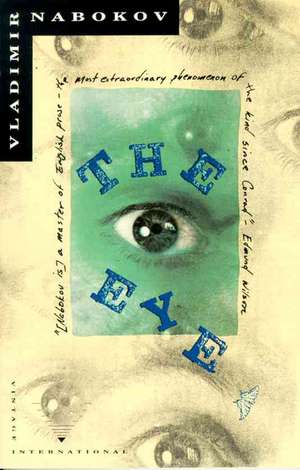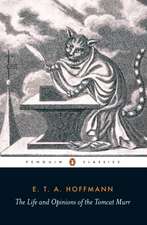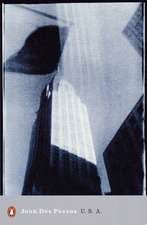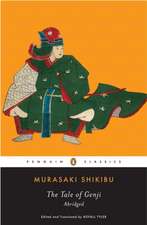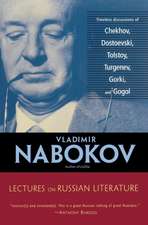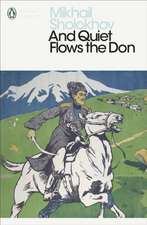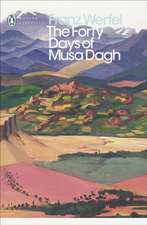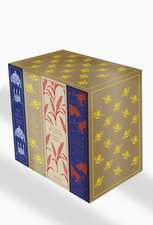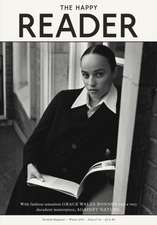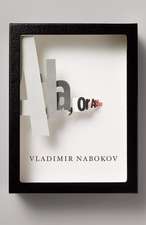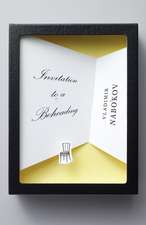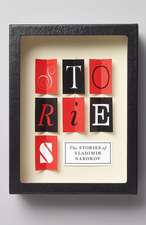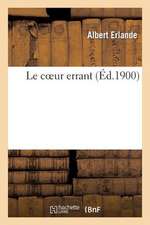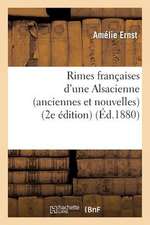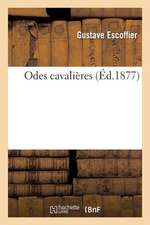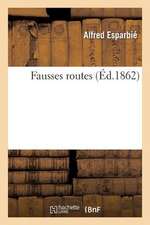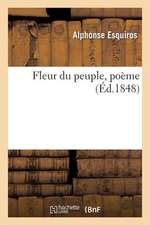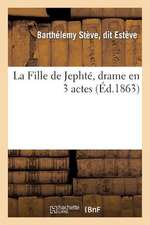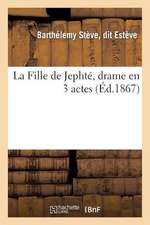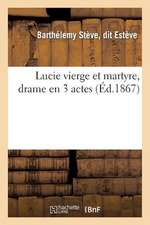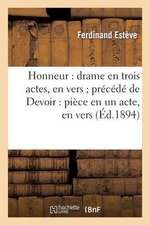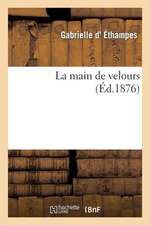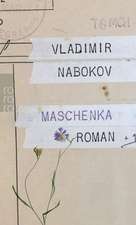The Eye
Autor Vladimir Nabokoven Limba Engleză Paperback – 31 aug 1990
| Toate formatele și edițiile | Preț | Express |
|---|---|---|
| Paperback (2) | 50.51 lei 23-34 zile | +14.64 lei 6-10 zile |
| Penguin Books – 29 ian 1992 | 50.51 lei 23-34 zile | +14.64 lei 6-10 zile |
| Vintage Publishing – 31 aug 1990 | 77.34 lei 3-5 săpt. |
Preț: 77.34 lei
Nou
Puncte Express: 116
Preț estimativ în valută:
14.80€ • 15.27$ • 12.53£
14.80€ • 15.27$ • 12.53£
Carte disponibilă
Livrare economică 12-26 februarie
Preluare comenzi: 021 569.72.76
Specificații
ISBN-13: 9780679727231
ISBN-10: 067972723X
Pagini: 126
Dimensiuni: 134 x 203 x 9 mm
Greutate: 0.14 kg
Ediția:Vintage Intl.
Editura: Vintage Publishing
ISBN-10: 067972723X
Pagini: 126
Dimensiuni: 134 x 203 x 9 mm
Greutate: 0.14 kg
Ediția:Vintage Intl.
Editura: Vintage Publishing
Notă biografică
Vladimir Vladimirovich Nabokov was born on April 23, 1899, in St. Petersburg, Russia. The Nabokovs were known for their high culture and commitment to public service, and the elder Nabokov was an outspoken opponent of antisemitism and one of the leaders of the opposition party, the Kadets. In 1919, following the Bolshevik revolution, he took his family into exile. Four years later he was shot and killed at a political rally in Berlin while trying to shield the speaker from right-wing assassins.
The Nabokov household was trilingual, and as a child Nabokov was already reading Wells, Poe, Browning, Keats, Flaubert, Verlaine, Rimbaud, Tolstoy, and Chekhov, alongside the popular entertainments of Sir Arthur Conan Doyle and Jules Verne. As a young man, he studied Slavic and romance languages at Trinity College, Cambridge, taking his honors degree in 1922. For the next eighteen years he lived in Berlin and Paris, writing prolifically in Russian under the pseudonym Sirin and supporting himself through translations, lessons in English and tennis, and by composing the first crossword puzzles in Russian. In 1925 he married Vera Slonim, with whom he had one child, a son, Dmitri.
Having already fled Russia and Germany, Nabokov became a refugee once more in 1940, when he was forced to leave France for the United States. There he taught at Wellesley, Harvard, and Cornell. He also gave up writing in Russian and began composing fiction in English. In his afterword to Lolita he claimed: "My private tragedy, which cannot, and indeed should not, be anybody's concern, is that I had to abandon my natural idiom, my untrammeled, rich, and infinitely docile Russian tongue for a second-rate brand of English, devoid of any of those apparatuses--the baffling mirror, the black velvet backdrop, the implied associations and traditions--which the native illusionist, frac-tails flying, can magically use to transcend the heritage in his own way." [p. 317] Yet Nabokov's American period saw the creation of what are arguably his greatest works, Bend Sinister (1947), Lolita (1955), Pnin (1957), and Pale Fire (1962), as well as the translation of his earlier Russian novels into English. He also undertook English translations of works by Lermontov and Pushkin and wrote several books of criticism. Vladimir Nabokov died in Montreux, Switzerland, in 1977.
The Nabokov household was trilingual, and as a child Nabokov was already reading Wells, Poe, Browning, Keats, Flaubert, Verlaine, Rimbaud, Tolstoy, and Chekhov, alongside the popular entertainments of Sir Arthur Conan Doyle and Jules Verne. As a young man, he studied Slavic and romance languages at Trinity College, Cambridge, taking his honors degree in 1922. For the next eighteen years he lived in Berlin and Paris, writing prolifically in Russian under the pseudonym Sirin and supporting himself through translations, lessons in English and tennis, and by composing the first crossword puzzles in Russian. In 1925 he married Vera Slonim, with whom he had one child, a son, Dmitri.
Having already fled Russia and Germany, Nabokov became a refugee once more in 1940, when he was forced to leave France for the United States. There he taught at Wellesley, Harvard, and Cornell. He also gave up writing in Russian and began composing fiction in English. In his afterword to Lolita he claimed: "My private tragedy, which cannot, and indeed should not, be anybody's concern, is that I had to abandon my natural idiom, my untrammeled, rich, and infinitely docile Russian tongue for a second-rate brand of English, devoid of any of those apparatuses--the baffling mirror, the black velvet backdrop, the implied associations and traditions--which the native illusionist, frac-tails flying, can magically use to transcend the heritage in his own way." [p. 317] Yet Nabokov's American period saw the creation of what are arguably his greatest works, Bend Sinister (1947), Lolita (1955), Pnin (1957), and Pale Fire (1962), as well as the translation of his earlier Russian novels into English. He also undertook English translations of works by Lermontov and Pushkin and wrote several books of criticism. Vladimir Nabokov died in Montreux, Switzerland, in 1977.
Descriere
Descriere de la o altă ediție sau format:
Smurov, a fussily self-conscious Russian tutor, shoots himself after a humiliating beating by his mistress' husband. Unsure whether his suicide has been successful or not, Smurov drifts around Berlin, observing his acquaintances, but finds he can discover very little about his own life from the opinions of his distracted, confused fellow-emigres.
Smurov, a fussily self-conscious Russian tutor, shoots himself after a humiliating beating by his mistress' husband. Unsure whether his suicide has been successful or not, Smurov drifts around Berlin, observing his acquaintances, but finds he can discover very little about his own life from the opinions of his distracted, confused fellow-emigres.
